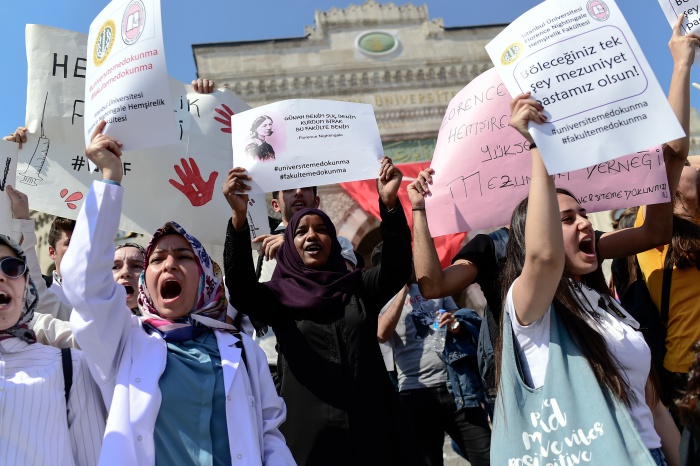Turkey’s universities are experiencing a period of self-censorship and a lack of academic freedom as hundreds of academic staff members face prosecution and thousands more have lost their jobs, international nongovernmental organization Human Rights Watch (HRW) said in a report released on Monday.
“The Turkish government’s crackdown is targeting academics and damaging its universities,” said Hugh Williamson, Europe and Central Asia director at Human Rights Watch. “Academics and students should be free to express, teach, and research controversial or critical ideas without risking dismissal or imprisonment.”
“The government has carried out mass firings of academics without due process, using dubious allegations of links to terrorism or the July 2016 coup plot. It is also investigating and prosecuting academics on trumped-up terrorism charges. The authorities are interfering with student protests on campus, and prosecuting student activists. And officials are interfering with academic research on controversial topics.
“Together these actions are creating a climate of fear and self-censorship on campus, and breaching Turkey’s obligations under human rights law to respect and protect academic freedom and freedom of expression,” said HRW in its report.
The dismissals and prosecutions result from an ongoing government crackdown launched in the wake of a July 2016 coup attempt in Turkey. Since then, nearly 6,000 academics have been dismissed from universities for alleged ties to terrorist organizations. This includes some 400 academics who signed a petition in 2016 condemning government operations in the Kurdish-dominated Southeast of the country. Many other academics have simply left Turkey.
HRW investigated eight cases of academics dismissed from their jobs under emergency decrees, saying: “It was impossible to determine the reasons for their dismissal as the decrees include no evidence of alleged wrongdoing or individualized justifications. The decrees only refer to generalized alleged links to ‘terrorist organizations’.”
In other cases examined by HRW evidence cited to justify dismissals included “the use of legal bank accounts, sending their children to private schools, or travel and research associated with their work as academics.”
University students have also faced the prospect of arrest and expulsion from their schools as the crackdown continues.
“On March 19, 2018, a group of students peacefully protested a stand set up by another group of students on the campus of Istanbul’s Boğaziçi University to support the Turkish military operation in the northwest Syrian district of Afrin. Erdoğan called the students who joined the protest “traitors to their country” and “terrorist youth” and demanded that their right to study at the university be revoked.”
In addition to the devastating consequence for those dismissed and their families, academic freedoms have come under increasing pressure.
“In one case, the university ethics commission delayed for four months a request for the required permission for a six-month research project related to the Kurdish issue on the grounds that the research topic was too sensitive,” the HRW report said.
Academics and students speaking to HRW said that even discussing some topics, such as the ongoing state of emergency, is now out of bounds.
Yücel Demirer, a political scientist dismissed under an emergency decree, said: “Universities are in a dire state. The quality of academia has significantly decreased. Nobody can speak out freely and without fear anymore.”
Another academic, Kerem Altıparmak, said: “Critical speech has been stifled. Even on the university public email list nobody makes any comment anymore that could be understood as being critical of the university, the administration, or the government. Many professors and lecturers are very careful of what they say in front of students.”
The Turkish government’s clampdown on academic freedoms comes despite them being protected by international human rights law. As the HRW report points out, “The International Covenant on Economic Social and Cultural Rights, to which Turkey is party, protects the right to education. The International Covenant on Civil and Political Rights (ICCPR), to which Turkey is party, protects the rights of individuals to freedom of opinion, expression, association, and assembly.”
(Ahval with Turkish Minute)
